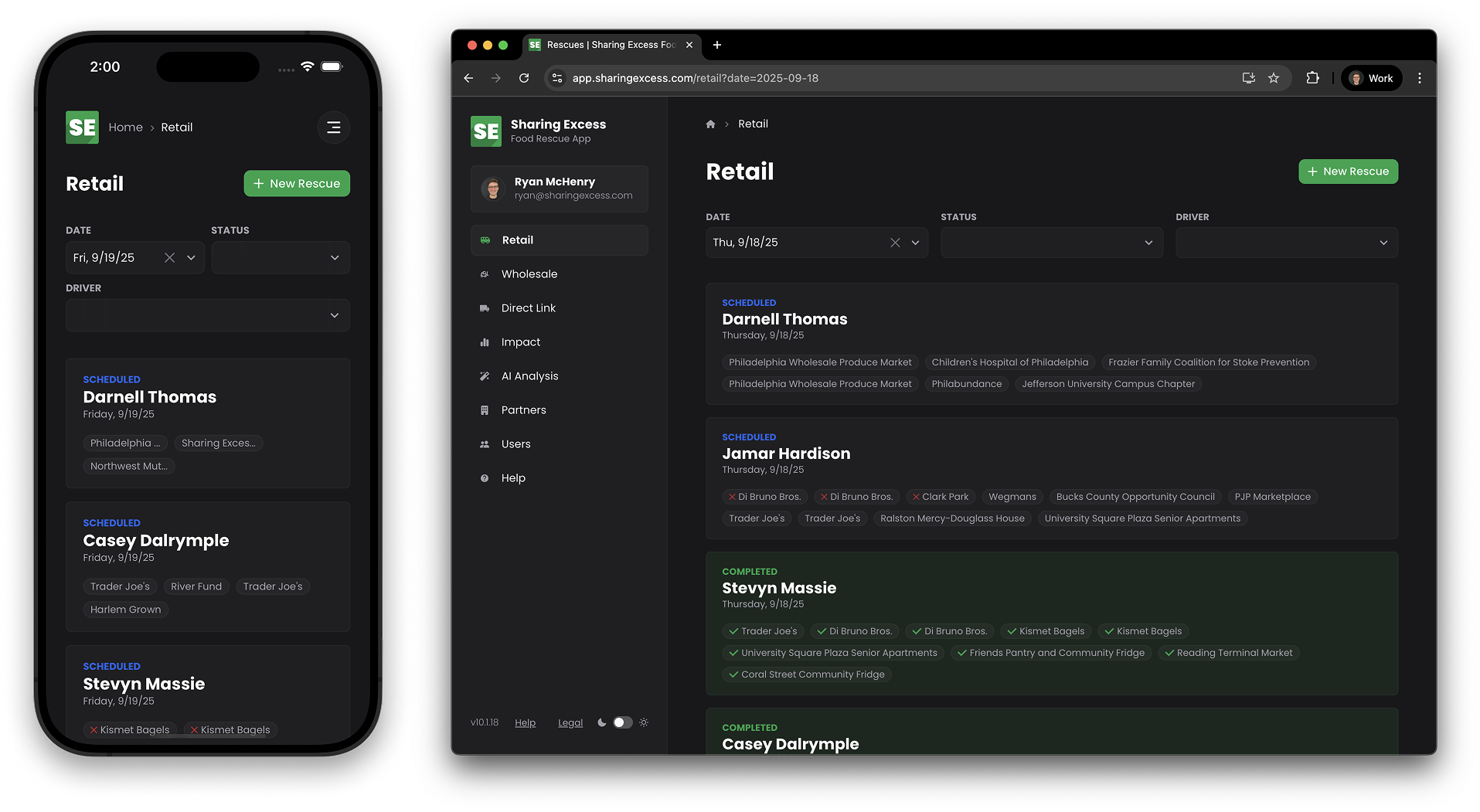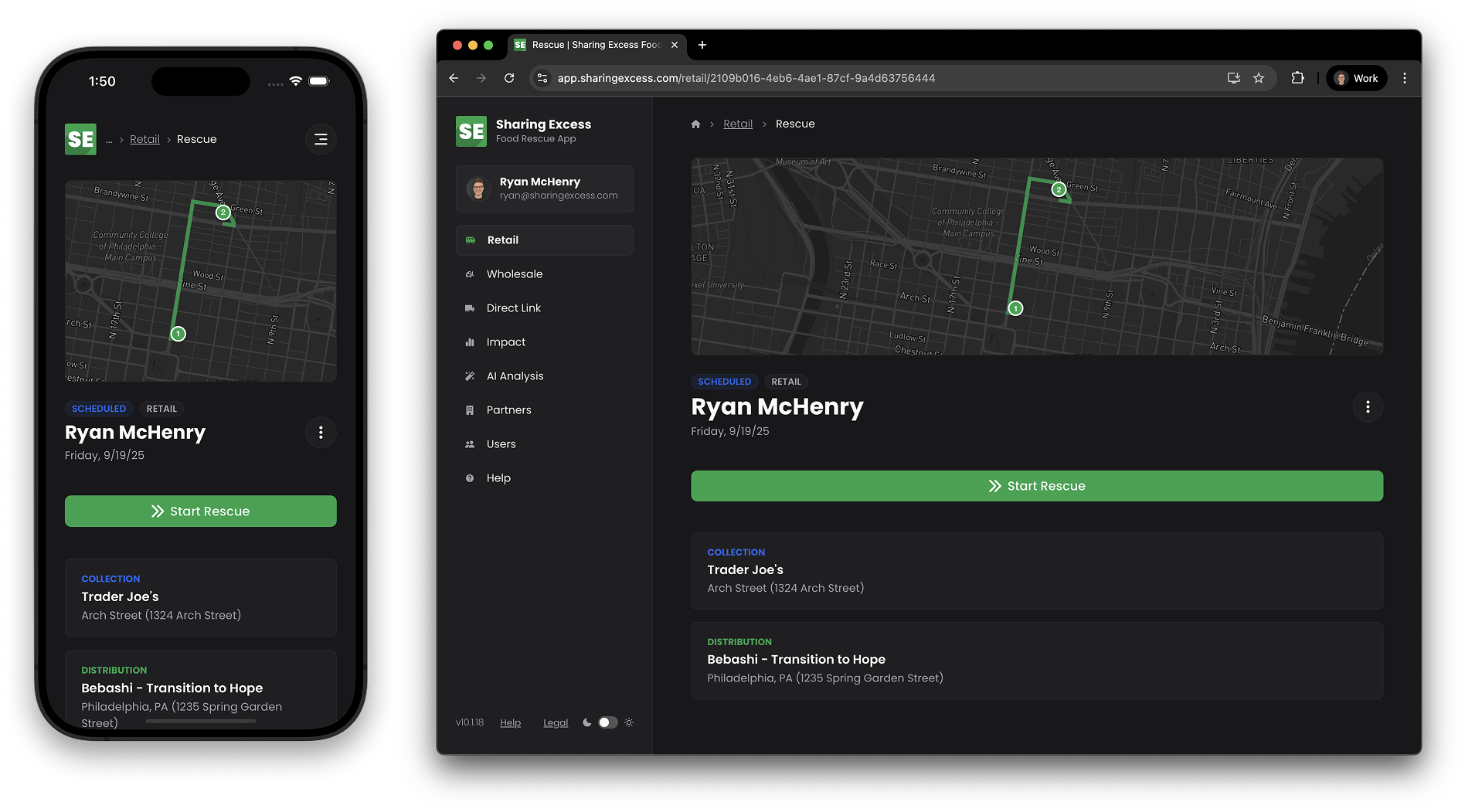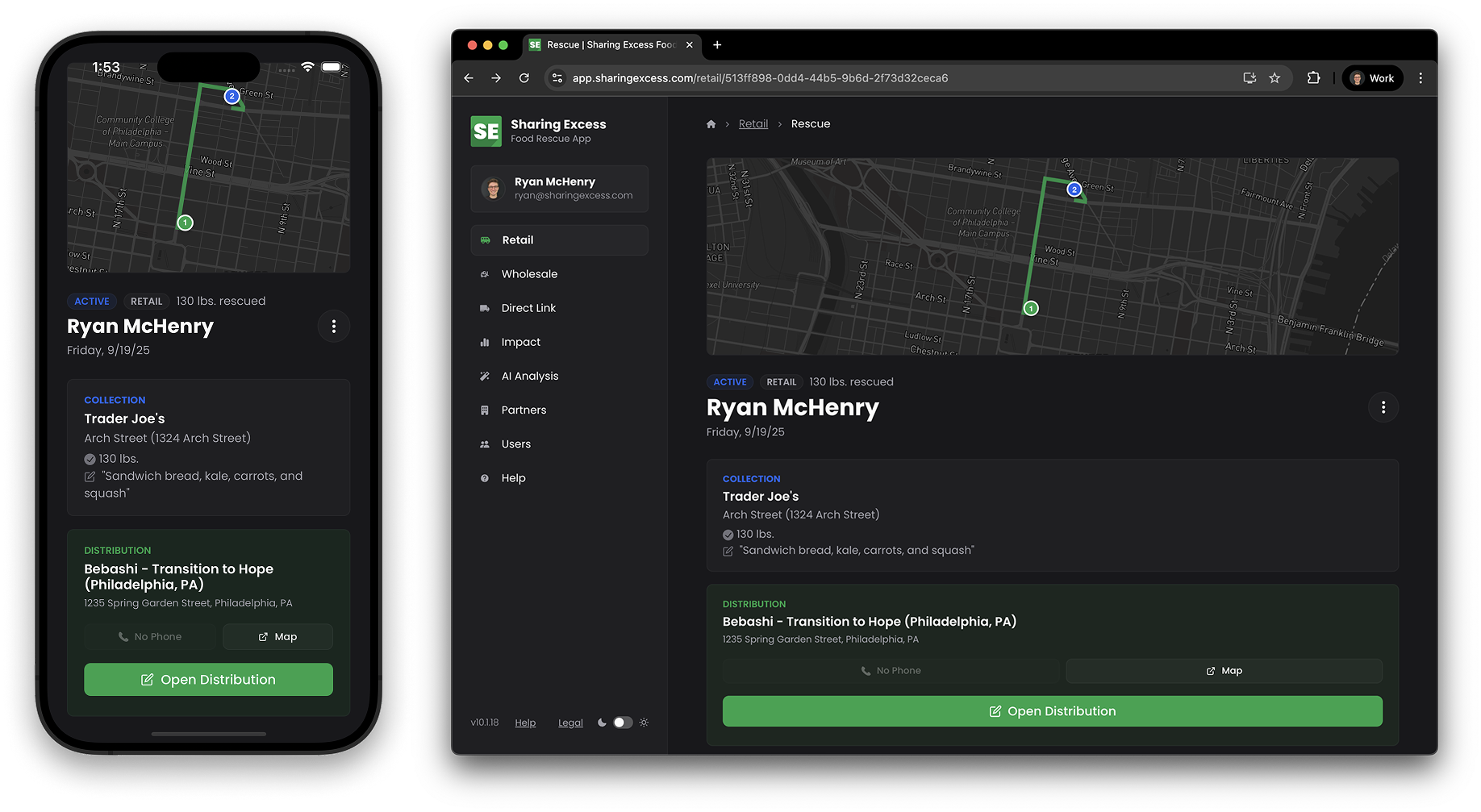🚛 Driver Guide
Welcome, food rescue volunteer! This guide will walk you through everything you need to know to complete a successful rescue using the Sharing Excess platform. Whether you're a brand new volunteer or just need a refresher, we'll take you step-by-step through the entire process.
🎯 What You'll Learn
By the end of this guide, you'll know how to:
- Navigate to pickup and delivery locations
- Record food weights and complete transfers
- Update rescue status and add important notes
- Ensure food safety throughout the process
📱 Before You Start
What You Need:
- Access to the Sharing Excess platform (ask your coordinator for login details)
- A vehicle suitable for food transport
- Basic food safety knowledge
- Your phone for navigation and platform updates
- Bags, boxes, or containers for food transport
- Optional: coolers for temperature-sensitive items
Important Safety Notes:
- Always prioritize food safety - keep cold foods cold!
- Follow all traffic laws and drive safely
- Don't hesitate to contact your coordinator with questions
- Take photos if you encounter any issues with food quality
🏠 Step 1: Getting Started
When you first log into the Sharing Excess platform, you'll see the home dashboard. This is your mission control center!

What you see here:
- Current
Rescues- Any rescues you're currently assigned to - Recent Activity - Your impact and recent completed rescues
- Navigation Menu - Easy access to different parts of the platform
Your Assignment: Your coordinator will assign rescues to you based on your availability and location. You can see basic details like timing, pickup areas, and estimated duration right from this screen.
📋 Step 2: Viewing Your Assigned Rescues
Click on "Rescues" in the navigation to see your assigned rescues. This is where you'll find the rescues your coordinator has assigned to you!

Understanding Your Assigned Rescues:
- Date & Time - When your rescue is scheduled
- Location Area - The general area where you'll be working
- Status - Current status of your assigned rescue
- Type -
Retail rescuesare typical routes,wholesale rescuesinvolve larger quantities
What Each Rescue Shows:
- Route - The route you'll be taking on an interactive map
- Partners Involved - Which organizations you'll be picking up from and delivering to
- Special Instructions - Any important notes about the rescue that your coordinator may have provided
Selecting Your Rescue: Click on your assigned rescue to see more details and begin your mission!
🎯 Step 3: Rescue Details & Getting Started
Once you've selected your assigned rescue, you'll see the detailed view with all the information you need to complete your mission.

Understanding Your Rescue:
- Transfer List - Each stop you need to make, in order
Collection Transfers- Where you'll pick up food (usually first)Distribution Transfers- Where you'll deliver food (usually after collections)- Contact Information - Phone numbers for each location
- Addresses - Full addresses with GPS coordinates
- Notes - Special instructions for each stop
Getting Started:
- Review the Route - Look at all your stops to plan your path
- Check Timing - Confirm you can complete everything within the scheduled timeframe
- Contact Locations - Call ahead if you're running late or have questions
- Start Your First Transfer - Click on the first stop to begin!
Pro Tips:
- Start with
collection transfers- you can't deliver food you haven't picked up yet! - Call locations if you're running more than 15 minutes late
- Take photos of any food quality issues you encounter
📦 Step 4: Collection - Picking Up Food
Your first stop is usually a collection transfer - picking up surplus food from a donor partner. This is where the food rescue process begins!

Arriving at the Pickup Location:
- Find the Right Person - Ask for the contact person listed in the app
- Introduce Yourself - "Hi, I'm [Your Name] from Sharing Excess here for the food pickup"
- Verify the Food - Make sure it's the food that was arranged for donation
- Check Quality - Ensure food is safe and suitable for donation
Recording the Pickup:
- Total Weight - Weigh all the food you're collecting (you'll need to use a scale to do this)
- Food Categories - Break down the weight by type (produce, dairy, bakery, etc.)
- Notes - Make sure to describe the food in detail - we'll use this on receipts later.
- Photos - Take pictures if there are any quality concerns
Food Safety Checklist:
- ✅ Cold foods are still cold (under 40°F)
- ✅ No signs of spoilage or contamination
- ✅ Packaging is intact and clean
- ✅ Food smells normal and looks fresh
Completing the Collection: Once you've loaded the food and recorded all details, mark the transfer as complete. The app will automatically move you to the next step in your rescue!
🚛 Step 5: Between Stops
After completing your collection transfer, you'll see your progress and next steps. Now it's time to head to your delivery locations!

What You See:
- Completed Transfers - Pickups you've already finished (marked with checkmarks)
- Current Transfer - The stop you're working on now
- Upcoming Transfers - Remaining deliveries to complete
- Total Progress - How much of the rescue is complete
During Transport:
- Keep Food Safe - Maintain proper temperatures, especially for dairy and meat
- Drive Carefully - You're carrying food that will feed families in need
- Update if Delayed - Use the app to add notes if you encounter delays
- Plan Your Route - Use GPS to navigate efficiently between locations
Communication Tips:
- Call ahead to delivery locations if you're running late
- Let recipients know approximately how much food you're bringing
- Ask about any special unloading instructions or access requirements
- Keep your Sharing Excess coordinator updated on any issues
🏪 Step 6: Distribution - Delivering Food
The final and most rewarding step - delivering rescued food to organizations that will get it to people who need it!

Arriving at the Delivery Location:
- Find the Right Person - Look for the contact person listed for this recipient partner
- Explain Your Delivery - "Hi, I'm [Your Name] from Sharing Excess with your food delivery"
- Help Unload - Work with their team to get food into their facility
- Verify Delivery - Make sure they're happy with the quality and quantity
Recording the Delivery:
- Weight Delivered - How much food you delivered to this location
- Percent of Total Dropped - What percentage of your total rescued food went here
- Notes - Any feedback from the recipient or delivery details
Making a Great Impression:
- Be friendly and professional - you represent Sharing Excess!
- Ask if they have any specific needs for future deliveries
- Share the impact - let them know this food might have gone to waste
- Take a moment to appreciate the difference you're making
Completing the Distribution: Record all the details and mark the transfer complete. If this was your last stop, congratulations - you've completed a full rescue!
🎉 Mission Complete!
Congratulations! You've successfully completed a food rescue and made a real difference in your community. Here's what happens next:
Immediate Impact:
- Families Fed - The food you rescued will provide meals for people in need
- Waste Prevented - You saved perfectly good food from going to landfills
- Environment Helped - Reduced greenhouse gas emissions from food waste
- Community Strengthened - Connected generous donors with helpful recipients
Your Dashboard Updates:
- Your completed rescue appears in your history
- Impact metrics show your contribution (pounds rescued, meals provided)
- Your coordinator can assign you new rescue opportunities
- Your volunteer profile shows your growing experience
What's Next:
- Wait for Your Next Assignment - Your coordinator will assign you new rescues based on your availability
- Share Your Experience - Tell friends and family about food rescue
- Provide Feedback - Let coordinators know how the rescue went
- Update Your Availability - Let your coordinator know when you're available for future missions
🆘 Troubleshooting & Tips
Common Situations & Solutions
🚫 Food Quality Issues
- Problem: Food doesn't look safe or fresh
- Solution: Take photos, document concerns, contact your coordinator before proceeding
- Remember: When in doubt, don't take it - food safety is always the priority
📱 App Technical Issues
- Problem: App won't load or update properly
- Solution: Try refreshing, check your internet connection. If nothing's working, you can use the "help" page in the menu to reach out to the tech team immediately.
- Backup: Keep coordinator phone numbers handy for manual updates
🕐 Running Late
- Problem: Traffic, previous stop took longer than expected
- Solution: Call upcoming locations to let them know, update notes in the app
- Prevention: Build buffer time into your schedule whenever possible.
📍 Can't Find the Location
- Problem: GPS leads to wrong place, unclear address
- Solution: Call the location directly, look for business signs, ask locals
- Tip: Many locations have specific loading docks or back entrances
Pro Tips from Experienced Drivers
🎯 Efficiency Tips
- Plan your route on a map app before starting
- Keep basic supplies in your car (scale, bags, cooler, sanitizer)
- Take photos of unusual food items for easy categorization
- Build relationships with regular pickup/delivery locations
🤝 Relationship Building
- Learn the names of regular contacts at each location
- Share positive feedback between donors and recipients
- Ask about their specific needs and preferences
- Be flexible and solution-oriented when issues arise
📊 Accurate Tracking
- Estimate weights conservatively when scales aren't available
- Take photos of food categories if you're unsure how to classify them
- Record detailed notes - they help improve future rescues
- Don't worry about perfect precision - your efforts matter most!
🌟 Why Your Work Matters
Every time you complete a rescue, you're part of something bigger:
📈 The Numbers
- 40% of food in the US goes to waste while millions face hunger
- Every 1.2 pounds of rescued food provides approximately one meal
- Your average rescue might save 50-200 pounds of food
- That's 40-165 meals for families in your community!
🌍 Environmental Impact
- Food waste is a major contributor to greenhouse gas emissions
- Every pound of food rescued reduces methane emissions from landfills
- You're helping create a more sustainable food system
- Small actions add up to massive environmental benefits
❤️ Community Impact
- You're connecting generous businesses with families in need
- Building relationships between different parts of your community
- Showing that neighbors care about neighbors
- Creating a model for how communities can work together
💪 Personal Growth
- Learning about food systems and sustainability
- Developing logistics and problem-solving skills
- Meeting amazing people committed to helping others
- Experiencing the joy of making a tangible difference
📞 Getting Help
Need Support?
- Technical Issues: Contact tech support through the app or call your coordinator
- Location Problems: Call the specific location directly using contact info in the app
- Emergency Situations: Always prioritize safety - pull over and call for help
- General Questions: Reach out to your volunteer coordinator or experienced drivers
Resources:
- Food Safety Guidelines: Ask your coordinator for detailed food handling training
- App Tutorial Videos: Available in the help section of the platform
- Volunteer Community: Connect with other drivers for tips and support
- Training Sessions: Attend in-person or virtual training opportunities
Remember: Every volunteer started as a beginner! Don't hesitate to ask questions, and know that the community is here to support you as you learn and grow.
🚀 Ready to Make a Difference?
You now have everything you need to complete your assigned food rescues! Remember:
- Start with Training - Your coordinator will start you with simpler rescues to learn the process
- Stay Safe - Food safety and driving safety are always the top priorities
- Ask Questions - The community is incredibly supportive of new volunteers
- Have Fun - You're doing amazing work that directly helps your neighbors
- Stay Consistent - Regular volunteers make the biggest impact over time
Thank you for joining the fight against food waste and hunger. Every rescue you complete makes our community stronger, more sustainable, and more caring.
Welcome to the Sharing Excess family! 🌱💚